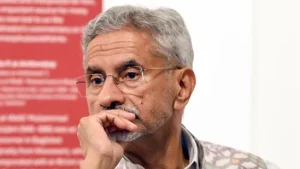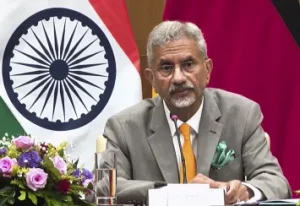New Delhi – External Affairs Minister S Jaishankar delivered a compelling address at the virtual BRICS meet on Monday, emphasizing the critical need for fair and transparent economic practices that benefit all nations in the global order. His statements reflect India’s commitment to fostering inclusive economic development and sustainable trade relationships within the multilateral framework.
During the BRICS meet, Jaishankar articulated India’s vision for a world where economic practices serve the collective good rather than benefiting select few. His remarks underscored the importance of creating an economic ecosystem that prioritizes fairness, transparency, and universal benefit across all participating nations and stakeholders.
Call for Constructive Trade Cooperation

At the BRICS meet, Jaishankar specifically highlighted the necessity for nations to adopt a “constructive and cooperative” approach towards international trade. This perspective aligns with India’s broader foreign policy objectives of promoting multilateral cooperation and sustainable economic development through collaborative frameworks.
The External Affairs Minister’s emphasis on constructive trade practices during the BRICS meet reflects the growing consensus among emerging economies about the need to reshape global economic architecture. His call for cooperation demonstrates India’s leadership in advocating for trade policies that foster mutual growth and development across different regions and economic systems.
Emphasis on Sustainable Economic Frameworks


Sustainability emerged as a central theme in Jaishankar’s address at the BRICS meet, where he stressed that global trade approaches must be sustainable for long-term prosperity. This focus on sustainability reflects the growing awareness among BRICS nations about the interconnectedness of economic policies, environmental concerns, and social development goals.
The BRICS meet provided an appropriate platform for discussing sustainable economic practices, given the collective economic weight and influence of the member nations. Jaishankar’s remarks about sustainability indicate India’s commitment to balancing economic growth with environmental responsibility and social equity in international trade relationships.
India’s Role in Multilateral Economic Diplomacy
Through his participation in the BRICS meet, Jaishankar reinforced India’s position as a responsible stakeholder in global economic governance. His advocacy for fair economic practices demonstrates India’s commitment to reforming international economic systems to make them more inclusive and representative of emerging economy perspectives.
The virtual format of the BRICS meet allowed for efficient diplomatic engagement while maintaining the substance and significance of multilateral discussions. Jaishankar’s virtual participation emphasized India’s continued commitment to the BRICS framework despite geographical and logistical challenges.
Building Consensus Among Emerging Economies

The BRICS meet served as a crucial platform for building consensus among major emerging economies on key economic principles. Jaishankar’s statements about fairness and transparency in economic practices likely resonated with other BRICS members who share similar concerns about current global economic structures and practices.
During the virtual BRICS meet, participating nations had the opportunity to align their positions on various economic issues, with India’s perspective contributing to the broader dialogue about reforming international economic governance structures to better serve the interests of developing and emerging economies.
Also Read: India EU Free Trade Agreement Talks | Powerful Headway in Negotiations
Strategic Implications for Global Trade
Jaishankar’s remarks at the BRICS meet carry significant strategic implications for the future of global trade relationships. His emphasis on fairness and universal benefit challenges existing trade paradigms that may disproportionately favor certain nations or economic blocs over others, particularly emerging and developing economies.
The constructive and cooperative approach advocated by Jaishankar during the BRICS meet represents a diplomatic strategy aimed at building sustainable partnerships rather than competitive relationships that might undermine global economic stability and growth prospects for all participating nations.
Future Directions for BRICS Cooperation
The virtual meeting format demonstrated the adaptability and resilience of BRICS cooperation mechanisms in addressing contemporary challenges. Jaishankar’s contributions to the discussion likely helped shape future directions for economic cooperation among member nations, emphasizing principles of mutual benefit and sustainable development.
Conclusion: Vision for Inclusive Global Economy
Jaishankar’s participation in the virtual BRICS meet highlighted India’s commitment to promoting an inclusive global economic order that prioritizes fairness, transparency, and universal benefit. His call for constructive and cooperative trade approaches reflects a mature diplomatic strategy aimed at building sustainable partnerships that can address contemporary economic challenges while fostering mutual prosperity.
The External Affairs Minister’s emphasis on sustainable and fair economic practices during the meeting demonstrates India’s leadership in advocating for reforms in global economic governance. As BRICS continues to evolve as an important multilateral platform, such principled positions contribute to building consensus around shared values and common objectives among member nations, ultimately strengthening the foundation for future cooperation and collective action in addressing global economic challenges.

